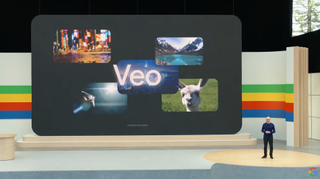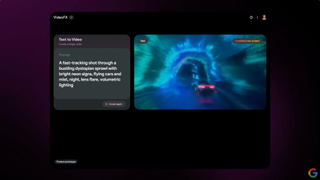Google reveals new video-generation AI tool, Veo, which it claims is the 'most capable' yet – and even Donald Glover loves it
Machine, make me a movie!

Google has unveiled its latest video-generation AI tool, named Veo, at its Google I/O 2024 live event. Veo is described as offering "improved consistency, quality, and output resolution" compared to previous models – and it's one of the more intriguing announcements from this year's Google I/O show.
Generating video content with AI is nothing new; tools like Synthesia, Colossyan, and Lumiere have been around for a little while now, riding the wave of generative AI's current popularity. Veo is only the latest offering, but it promises to deliver a more advanced video-generation experience than ever before.

To showcase Veo, Google recruited a gang of software engineers and film creatives, led by actor, musician, writer, and director Donald Glover (of Community and Atlanta fame) to produce a short film together. The film wasn't actually shown at I/O, but Google promises that it's "coming soon".
As someone who is simultaneously dubious of generative AI in the arts and also a big fan of Glover's work (Awaken, My Love! is in my personal top five albums of all time), I'm cautiously excited to see it.
Eye spy
Glover praises Veo's capabilities on the basis of speed: this isn't a deletion of human ideas, but rather a tool that can be utilized by creatives to "make mistakes faster", as Glover puts it.
The flexibility of Veo's prompt reading is a key point here. It's capable of understanding prompts in text, image, or video format, paying attention to important details like cinematic style, camera positioning (for example, a birds-eye-view shot or fast-tracking shot), time elapsed on camera, and lighting types. It also has an improved capability to accurately and consistently render objects and how they interact with their surroundings.
Google DeepMind CEO Demis Hassabis demonstrated this with a clip of a car speeding through a dystopian cyberpunk city.
Get the best Black Friday deals direct to your inbox, plus news, reviews, and more.
Sign up to be the first to know about unmissable Black Friday deals on top tech, plus get all your favorite TechRadar content.

It can also be used for things like storyboarding and editing, potentially augmenting the work of existing filmmakers. While working with Glover, Google DeepMind research scientist Kory Mathewson explains how Veo allows creatives to "visualize things on a timescale that's ten or a hundred times faster than before", accelerating the creative process by using generative AI for planning purposes.
Veo will be debuting as part of a new experimental tool called VideoFX, which will be available soon for beta testers in Google Labs.

Christian is TechRadar’s UK-based Computing Editor. He came to us from Maximum PC magazine, where he fell in love with computer hardware and building PCs. He was a regular fixture amongst our freelance review team before making the jump to TechRadar, and can usually be found drooling over the latest high-end graphics card or gaming laptop before looking at his bank account balance and crying.
Christian is a keen campaigner for LGBTQ+ rights and the owner of a charming rescue dog named Lucy, having adopted her after he beat cancer in 2021. She keeps him fit and healthy through a combination of face-licking and long walks, and only occasionally barks at him to demand treats when he’s trying to work from home.